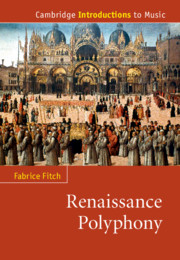Book contents
- Cambridge Introductions to Music
- Cambridge Introductions to Music Renaissance Polyphony
- Copyright page
- Dedication
- Contents
- Illustrations
- Figures
- Tables
- Music examples
- Acknowledgements
- Note on the music examples
- Note on the bibliography
- Abbreviations
- Chapter 1 Introducing Renaissance polyphony
- Chapter 2 Making polyphony: sources and practice
- Chapter 3 Makers of polyphony
- Chapter 4 Pitch: an overview
- Chapter 5 Voice-names, ranges, and functions
- Chapter 6 Mensural notation, duration, and metre
- Chapter 7 Genre, texts, forms
- Chapter 8 ‘Cantus magnus’: music for the Mass
- Chapter 9 ‘Cantus mediocris’: the motet
- Chapter 10 ‘Cantus parvus’: secular music
- Chapter 11 Scoring, texture, scale
- Chapter 12 Understanding musical borrowing
- Chapter 13 Canons, puzzles, games
- Chapter 14 Performance practice: a brief introduction
- Notes
- Glossary
- Bibliography
- Index of compositions
- General index
- Cambridge Introductions to Music
Chapter 8 - ‘Cantus magnus’: music for the Mass
Published online by Cambridge University Press: 13 August 2020
- Cambridge Introductions to Music
- Cambridge Introductions to Music Renaissance Polyphony
- Copyright page
- Dedication
- Contents
- Illustrations
- Figures
- Tables
- Music examples
- Acknowledgements
- Note on the music examples
- Note on the bibliography
- Abbreviations
- Chapter 1 Introducing Renaissance polyphony
- Chapter 2 Making polyphony: sources and practice
- Chapter 3 Makers of polyphony
- Chapter 4 Pitch: an overview
- Chapter 5 Voice-names, ranges, and functions
- Chapter 6 Mensural notation, duration, and metre
- Chapter 7 Genre, texts, forms
- Chapter 8 ‘Cantus magnus’: music for the Mass
- Chapter 9 ‘Cantus mediocris’: the motet
- Chapter 10 ‘Cantus parvus’: secular music
- Chapter 11 Scoring, texture, scale
- Chapter 12 Understanding musical borrowing
- Chapter 13 Canons, puzzles, games
- Chapter 14 Performance practice: a brief introduction
- Notes
- Glossary
- Bibliography
- Index of compositions
- General index
- Cambridge Introductions to Music
Summary
This chapter introduces the first of the fifteenth-century teacher Johannes Tinctoris’ three ‘registers’ of polyphony: the music for the Mass, beginning with the Mass cycle (setting the Ordinary of the Mass, in liturgical terms) and its development during the Renaissance, then the Propers of the Mass, then finally the Requiem. Whereas the setting of Propers and their chants is a practice as old as polyphony itself, the Mass cycle and the Requiem were more recent phenomena. Guillaume Du Fay’s ‘Missa L’Homme armé’ appears as a case-study, showing how the Mass cycle builds on the work of previous composers of Mass-music in England and aspects of the isorhythmic tradition (which in a sense it supersedes), whilst introducing new elements that condition the form’s later history through to the end of the Renaissance. The end of the chapter highlights the porousness of practice sketched earlier with regard to the boundary between mass-music and motets, discussed in the following chapter.
- Type
- Chapter
- Information
- Renaissance Polyphony , pp. 109 - 119Publisher: Cambridge University PressPrint publication year: 2020



